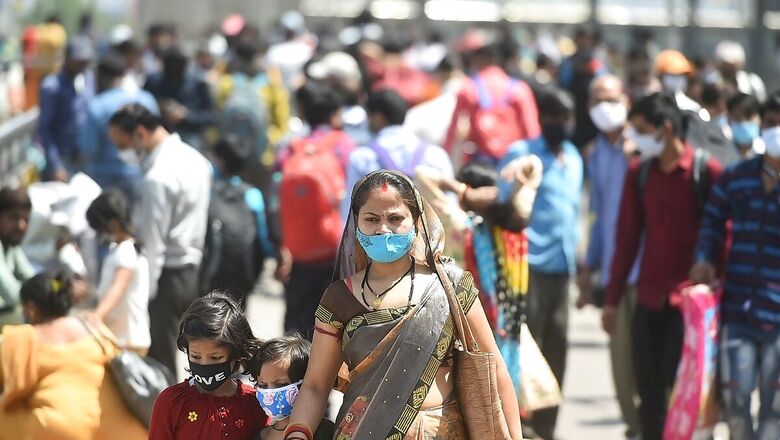
views
As Covid-19 cases spiral, state governments across the country are imposing extraordinary restrictions on citizens, throwing up a question that was asked a year ago: what do these curbs on civil liberties mean for democracy?
From the onset of the Covid-19 pandemic, democratic governments have been in a Catch 22. Curbing freedom of movement, assembly, profession, dissent and expression invites accusations of undermining democracy. But not doing so is seen as irresponsible.
Balancing democratic freedoms and public safety is tricky. The individual liberty versus social responsibility debate is as old as democracy itself, but has come to the fore with the exceptional constitutional responses by governments to the ongoing pandemic.
In March 2020, when a pan-India lockdown was imposed, it was positioned as a threat to human health, but equally, to Indian democracy. Covid-19 would pass, but democratic freedoms would be lost, political pundits feared.
The reverse happened; the lockdown was lifted and individual freedoms and democratic processes were restored, but the pandemic remained.
The vast majority of Indian citizens had accepted the lockdown as necessary and quietly endured untold hardships – separation from loved ones, closure of businesses, loss of jobs, salary cuts and displacement.
A chronically undisciplined population overnight became orderly. India’s social capital came into play, in public efforts to mitigate the worst fallouts of the crisis. In many ways, it was a testimony to public confidence in Prime Minister Narendra Modi.
Admittedly, the pandemic also brought to the fore structural inequalities inimical to democracy, such as the inadequate public health system, lack of social safety nets and the digital divide, especially between rich and poor students.
As the first wave receded and restrictions were progressively lifted, the narrative shifted to collective accountability and Covid-appropriate behaviour, putting the onus of safety on citizens. But the ceaseless vigilance demanded of citizens apparently fell prey to Covid fatigue and democratic processes.
Citizens at once reclaimed their rights to freedom of assembly and dissent. Farmers massed at Delhi’s borders in protest against three new agricultural laws, encouraged by political and civil society leaders. Social distancing and masking up went by the board, as the leaders themselves appeared maskless in public.
In the name of freedom of religion, hundreds of thousands gathered for the Mahakumbh at Haridwar, where maskless priests conducted rituals. Bizarrely, even as the Uttarakhand High Court mandated Covid-negative reports for all visitors, chief minister Tirath Singh Rawat declared: “Nobody will be stopped in the name of Covid-19…faith in God will overcome the fear of the virus.”
The reverse happened in severely Covid-hit Maharashtra, when the administration denied permission for a religious procession in Nanded. It was the citizens who behaved irresponsibly; sword-wielding protesters charged the police, inflicting injuries.
In Odisha earlier this month, ministers and MLAs threw social distancing to the winds when they congregated to celebrate the unveiling of a sculpture of Mahatma Gandhi. Worse, the ‘chin diaper’ syndrome was in full flower, with masks slipping below nose and mouth.
The wheels of democracy trundled on, with the Bihar elections in 2020 and those in West Bengal, Kerala, Tamil Nadu, Assam and Puducherry in 2021. Thousands have attended election rallies in these states, addressed by maskless leaders. The various parties in the fray could not arrive at a consensus on keeping public meetings to an absolute minimum.
Prompted by the judiciary, the Election Commission threatened to ban rallies if Covid-19 protocols were not followed. It was too little, too late.
By the second week of April, daily cases had breached the 1.5 lakh mark. What changed? Is democracy and the primacy accorded to individual freedoms over responsible behaviour to blame?
The fact is that India’s political and social leadership – across the board – failed to lead by power of example. Whether their Covid-inappropriate behaviour, especially in the face of virulent new strains, triggered ‘superspreaders’ is not the point. What is clear is that it led to public insouciance.
Public health is not an enemy of civil liberties. Within a democratic framework, tackling a public health crisis involves coordination between political/civil society leaders, the executive, the relevant sectors of industry and the people. This, in turn, demands transparency in decision-making and mutual trust.
As the pandemic follows its cyclical course, the pursuit of individual agendas by all sections has led to a lack of trust and prevented a cohesive response. Restrictions earlier seen as reasonable and necessary have been dumped. Citizens’ behaviour reflects this lack of social cohesion. In the end, we all are to blame.
Read all the Latest News, Breaking News and Coronavirus News here. Follow us on Facebook, Twitter and Telegram.




















Comments
0 comment